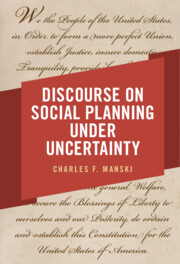1 - Credible Planning under Uncertainty
Published online by Cambridge University Press: 02 January 2025
Summary
Section 1.1 calls attention to the prevalent research practice that studies planning with incredible certitude. Section 1.2 contrasts the conceptions of uncertainty in consequentialist and axiomatic decision theory. Section 1.3 presents the formal structure of consequentialist theory, which is used throughout the book. Section 1.4 explains the prevalent econometric characterization of uncertainty, which distinguishes identification problems and statistical imprecision. Section 1.5 discusses the distinct perspectives on social welfare expressed in various strands of research on planning.
Information
- Type
- Chapter
- Information
- Discourse on Social Planning under Uncertainty , pp. 1 - 32Publisher: Cambridge University PressPrint publication year: 2025
